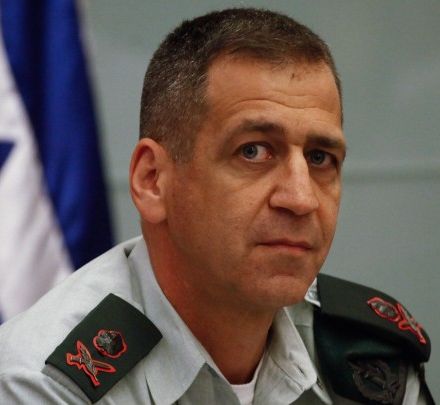Two Mid East intelligence chiefs, Gen. Kochavi and Prince Bandar, were wrong about Syria
The appointment of Military Intelligence Director Maj. Gen. Aviv Kochavi to OC Northern Command, announced Friday, April 25, raised some eyebrows in top IDF command circles. During the three years he served as AMAN chief, Kochavi was credited with enhancing the corps’ operational capabilities to the highest standard in its history and transforming it into a combat force.
But, on the debit side, Kochavi was also responsible for three major miscalculations.
In 2012, he overestimated the Muslim Brotherhood’s Mohamed Morsi’s prospects of lasting the course as Egyptian’s first elected president and failed to pick up on the coup to unseat him when it was hatched by strongman Gen. Abdel-Fatah El-Sisi, who is himself running for the presidency next month.
In judging Islamist rule in Cairo was there to stay, Kochavi did not appreciate the force of the antagonism to the Brotherhood which contributed to Morsi’s overthrow, as it built up in much of the Arab world.
This misjudgment affected Israeli policy-making adversely up to the present with regard to the Brotherhood’s Palestinan offspring Hamas and the Gaza Strip.
His second mistake was the opposite of the first. While overrating Morsi’s chances of survival, he underrated those of the Syrian president Bashar Assad. In that error, he was in august company. Prince Bandar Bin Sultan made the same mistake and paid for it by losing his job as Director of Saudi General Intelligence on April 15.
From the early days of the civil war in 2011, the AMAN chief stuck to the conviction that Assad was riding for a fall, refusing to acknowledge that the war had turned in his favor from the beginning of 2013.
Kochavi’s third slip-up was his acceptance of the Netanyahu government’s decision to let the Iran’s Lebanese Shiite proxy Hizballah lend its fighting strength to Assad. This increment became a strong factor in bringing about Syrian military successes against the Syrian insurgency.
This Israeli policy, which drew heavily on AMAN's recommendations and assessments, was motivated by two objectives:
1. To get Hizballah’s forces removed far from the Lebanese border with Israel, and
2. To let Hizballah drain its strength by its division between the two fronts.
Israeli strategists calculated that to keep Hizballah’s strength down, it would be enough to apply the brakes to its supply of high-quality and quantities of weapons, by bombing consignments ad hoc as they were transferred from Syria to Hizballah bases in Lebanon.
Neither objective was achieved.
The fighting in Syria did not weaken Hizballah but, to the contrary, toughened its operatives by hard combat conditions. The IDF has not been exposed to operations of comparable intensity since the 2006 Lebanese war.
Israel’s bid to show that its heavy losses and many wounded fighters were undermining Hizballah at home also misfired. Hizballah is emerging with a high reputation as the dominant force in Lebanon, facing no real challenge from any Western or Middle Eastern political, military or intelligence quarter.
Its intervention in the Syrian conflict has given Hizballah strategic depth, a great asset in the event of a war with Israel.
All these benefits accrued from – and contributed to – Iran’s tightening grip on Syria and the enhancement of their three-way alliance in the region.
Prince Bandar lost his job mainly because he was unable to deliver on the personal promise he gave King Abdullah to bring about the downfall of President Assad at the hands of Saudi-backed rebels. He was also criticized for seeking to attain this goal by associating with extremist Islamist elements in the Syrian rebel movement, including some tied to al Qaeda.
Prince Bandar, like Kochavi, showed brilliance in much of his accomplishments – notably the project he engineered in conjunction with the US and Jordan to build a defense system inside Syria for keeping al Qaeda at bay from the Golan and the Syrian-Israeli and Syrian-Jordanian borders.
Unlike the Saudi prince, the Israeli intelligence chief was not kicked out but sideways. His new appointment as OC Northern Command takes him out of the back rooms at General Command headquarters in Tel Aviv and puts him on the front lines against Syria and Hizballah.
There, he will have to grapple with the consequences of the mistakes he made far from the action.
debkafile’s military sources learn that this appointment was approved by the Deputy Chief of Staff Maj. Gen. Gady Eisenkott, who is slated to succeed Lt. Gen. Benny Gantz Chief of Staff next year.
Gen. Eisenkott is a veteran of the northern front. As Head of Operations at the General Command in the 2006 Lebanese war, he won kudos for the offensive operations he initiated to correct wrong decisions made by Lt. Gen. Dan Halutz, the chief of staff who led that war.
In the course of that conflict, Eisenkott was promoted to OC Northern command, a post he held for five years until his elevation to Deputy Chief of Staff in 2011.
In recommending Kochavi for the sensitive northern command, he took into account the latter’s varied and successful career as a combat officer prior to his work in intelligence, including his experience in undercover operations behind Syrian lines.
Some critics regard Kochavi's successor Brig. Gen. Hertzi Levy, whose appointment as Head of Military Intelligence was unveiled at the same time, would have been a better choice for the Northern Command. The brigadier comes from Sayeret Matkal and the Paratroop Corps.
But the final decision was approved by Israel’s three security czars, Defense Minister Moshe Ya’alon and the two Generals Gantz and Eisenkott.


